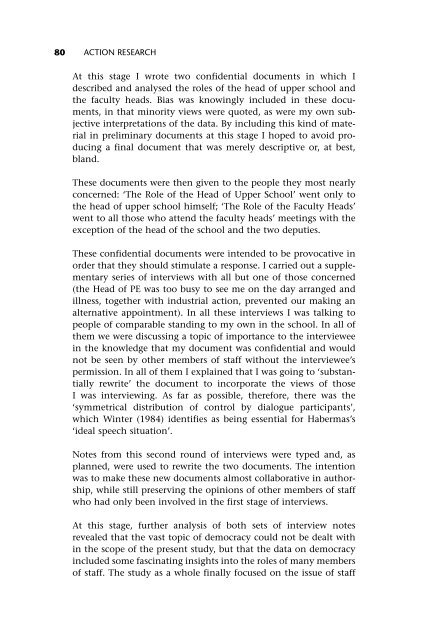Action Research A Methodology for Change and Development
Action Research A Methodology for Change and Development
Action Research A Methodology for Change and Development
Create successful ePaper yourself
Turn your PDF publications into a flip-book with our unique Google optimized e-Paper software.
80 ACTION RESEARCH<br />
At this stage I wrote two confidential documents in which I<br />
described <strong>and</strong> analysed the roles of the head of upper school <strong>and</strong><br />
the faculty heads. Bias was knowingly included in these documents,<br />
in that minority views were quoted, as were my own subjective<br />
interpretations of the data. By including this kind of material<br />
in preliminary documents at this stage I hoped to avoid producing<br />
a final document that was merely descriptive or, at best,<br />
bl<strong>and</strong>.<br />
These documents were then given to the people they most nearly<br />
concerned: ‘The Role of the Head of Upper School’ went only to<br />
the head of upper school himself; ‘The Role of the Faculty Heads’<br />
went to all those who attend the faculty heads’ meetings with the<br />
exception of the head of the school <strong>and</strong> the two deputies.<br />
These confidential documents were intended to be provocative in<br />
order that they should stimulate a response. I carried out a supplementary<br />
series of interviews with all but one of those concerned<br />
(the Head of PE was too busy to see me on the day arranged <strong>and</strong><br />
illness, together with industrial action, prevented our making an<br />
alternative appointment). In all these interviews I was talking to<br />
people of comparable st<strong>and</strong>ing to my own in the school. In all of<br />
them we were discussing a topic of importance to the interviewee<br />
in the knowledge that my document was confidential <strong>and</strong> would<br />
not be seen by other members of staff without the interviewee’s<br />
permission. In all of them I explained that I was going to ‘substantially<br />
rewrite’ the document to incorporate the views of those<br />
I was interviewing. As far as possible, there<strong>for</strong>e, there was the<br />
‘symmetrical distribution of control by dialogue participants’,<br />
which Winter (1984) identifies as being essential <strong>for</strong> Habermas’s<br />
‘ideal speech situation’.<br />
Notes from this second round of interviews were typed <strong>and</strong>, as<br />
planned, were used to rewrite the two documents. The intention<br />
was to make these new documents almost collaborative in authorship,<br />
while still preserving the opinions of other members of staff<br />
who had only been involved in the first stage of interviews.<br />
At this stage, further analysis of both sets of interview notes<br />
revealed that the vast topic of democracy could not be dealt with<br />
in the scope of the present study, but that the data on democracy<br />
included some fascinating insights into the roles of many members<br />
of staff. The study as a whole finally focused on the issue of staff

















